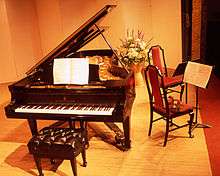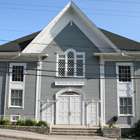Bay Chamber Concerts
Bay Chamber Concerts is a non-profit organization located in downtown Rockport, Maine. Bay Chamber Concerts plays a principal role in bringing music, particularly classical music, to the Mid Coast area. During the months of July and August Bay Chamber Concerts hosts a Summer Music Festival bringing an assortment of musical groups to the Rockport Opera House and surrounding venues. In addition, from September to June, Bay Chamber brings various performers to the Camden, Rockport and Rockland area through their Performing Arts Series. Bay Chamber Music School offers private instruction and group classes to all ages and abilities, regardless of ability to pay. The organization is committed to offering many free programs to the community and especially to those who otherwise have no access to live performance and music education.

Bay Chamber founding and history
Andrew Wolf, pianist, and flutist Thomas Wolf founded Bay Chamber Concerts as a summer chamber music festival in 1961. The teenage brothers with the inspiration and financial assistance of Mrs. Mary Louise Curtis Zimbalist Bok, their grandmother (the violinist Lea Luboshutz) and their uncle (the opera impresario, Boris Goldovsky) established Bay Chamber in an effort to revive a musical tradition begun by the great philanthropist Mary Louise Curtis in 1930.
From 1930 to 1945 Mary Louise Curtis hosted a summer music program at the Curtis Institute of Music. Illustrious musicians from all over the world came to Rockport, Maine to teach and to give concerts in a boat barn. Despite the summer music program's discontinuation in 1945, many musicians continued to come to the Rockport area with their students. As summer residents of Rockport, Maine since early childhood and alumni of the Curtis Institute, Thomas and Andrew Wolf viewed founding Bay Chamber Concerts as a means of continuing Curtis's musical legacy.
The early concerts, under the artistic direction of Thomas Wolf, were held in an Episcopal Church in Camden. At the same time, the Wolf brothers were instrumental in establishing the Fox Island Concerts on Vinalhaven, an island off the mid-coast of Maine. In 1970, Bay Chamber Concerts assisted in the founding of Machias Bay Chamber Concerts in a town 30 miles from the Canada–US border. Under Bay Chamber Concerts' auspices each summer, both locations continue to present numerous concerts.
Andrew Wolf became Bay Chamber Concert's artistic director in 1963. During his tenure, the concerts were moved to the newly renovated Rockport Opera House effectively doubling the seating capacity to 400 and securing a venue with marvelous acoustics. In 1974, Bay Chamber Concerts became a year-round organization, presenting a mix-genre musical series during the fall, winter and spring. The Bay Chamber Music School was founded in 2011.
Following the death of Andrew Wolf in December 1985, Thomas Wolf took over once again as Artistic Director and an endowment was created to underwrite a national music award in Andrew Wolf's memory. Upon his retirement in 2011, Manuel Bagorro took over as Artistic Director and Monica Kelly, as Executive Director.

In 1993, Bay Chamber Concerts, along with the Town of Rockport and private contributors, raised $1,000,000 to restore the Rockport Opera House, improving the auditorium, adding meeting rooms and its hospitality facilities. The Rockport Opera House remains an important venue for Bay Chamber Concerts. It now also uses the recently renovated (2005) 350-seat Strand Theatre in Rockland, the 500-seat Camden Opera House, the 800-seat Strom Auditorium in Rockport and the newly restored Union Hall, also in Rockport.
Bay Chamber Mission
The mission of Bay Chamber Concerts and Music School is to enrich the lives of people in our community through high-quality concert programs, music education and community engagement. Bay Chamber Concerts is a 501(c)(3) registered non-profit organization.
Young Stars of Maine
The Young Stars of Maine awards the following six prizes to young Maine music students: the A.H. Chatfield, Jr. Piano Prize, the Jean and Harvey Picker Senior Prize (instrumental or vocal), the Elsie Bixler Junior Prize (instrumental), the Ezra Rachlin Fun with Music (instrumental or vocal), the Nathan E. Corning Jazz Prize (instrumental or vocal), and the Summer Music Strings Prize. Auditions are held for prospective prize winners. The Young Stars Prizes are awarded at a special concert, given by the audition winners at the Rockport Opera House.

The Andrew Wolf Chamber Award
At the time of his death at the age of 42 on December 22, 1985, Andrew Wolf was widely recognized as one of the nation's leading chamber music pianists. Perhaps best known through his concerts with Isaac Stern, he collaborated with many artists including the cellists, Leonard Rose and Leslie Parnas, as well as the Vermeer Quartet. Born into a musical family, he studied first with his grandmother, the violinist Lea Luboshutz. But it was under Rudolf Serkin and Miercyslaw Horszowski at the Curtis Institute of Music that he began to develop his unique pianistic style that Le Nouveau Journal in Paris described as "stunning and dramatic." When he made his debut with the Philadelphia Orchestra, The Philadelphia Inquirer described him as "a young poet of the piano." In the next two decades he established a specialty as a chamber music pianist and was described by the Washington Star "as a pianist in a class quite by himself." Devoting himself to chamber music, Andrew Wolf helped establish the Bay Chamber Concerts series in Rockport, Maine and was its Artistic Director for 23 years. He also served as Director of the All Newton Music School in Massachusetts from 1977 to 1985.
In early 1986, many of Andrew Wolf's friends and colleagues established a specially endowed prize that would encourage other chamber music pianists. Because Andrew Wolf was philosophically opposed to musical competitions—which could damage the careers of those who did not win—the procedure for selecting the recipient of the Andrew Wolf Chamber Music Award does not involve any public competition. Rather, it involves a process of confidential nominations and a review of nominees through tapes and public performances. Only the names of award recipients are announced to the public. The award recipient must be a pianist under the age of forty who is an American citizen or permanent resident of the United States and has made a serious commitment and contribution to the chamber music field.
Odeon Ensemble Programs
Mission and History Odeon Ensemble Program was founded in 2000 as a community youth string orchestra and in 2006 merged with Bay Chamber Concerts. The mission of Odeon is to offer string musicians of all ages the opportunity to play in a variety of ensemble settings, helping them develop the musical skills necessary for ensemble play and providing them with opportunities to perform orchestral and other string works in concerts that are open to the public.
Envision - A Young People's Chamber Music Workshop The goal of the Envision Chamber Music Workshop is to celebrate the joy of music-making in a supportive environment that inspires musical and personal growth. Students will receive coaching from young performers and educators including Josie and Sophie Davis, Anna and Maya French, Nate Martin and Colin Wheatley. Many of the faculty grew up studying music in Maine.
ELIGIBILITY: This five-day program is open to string, piano, flute, and clarinet individual applicants as well as pre-formed ensembles. Students should be between the ages of 12-18, though exceptions may be made on a case-by-case basis.
See also
- Chamber Music
- Camden, Maine
- Rockport, Maine
- Rockland, Maine
- Curtis Institute